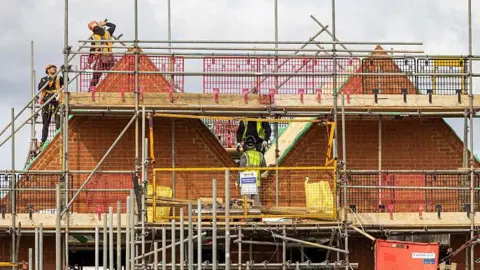Pritti Mistry,Business reporter and Marc Ashdown,Business correspondent

 Getty Images
Getty Images
Nature is not a blocker to housing growth and the government risks missing both its housing and nature targets if it views it as one, a cross-party group of MPs has warned in a new report.
The Planning and Infrastructure Bill overrides existing habitat protections, which the government has suggested is a barrier to its target to build 1.5 million houses by the end of this parliament.
But in a report published on Sunday, the Environmental Audit Committee (EAC) found the measures outlined in the bill are not enough to allow the government to meet its goals.
"Using nature as a scapegoat means that the government will be less effective at tackling some of the genuine challenges facing the planning system," the report said.
A Ministry of Housing spokesperson said it was fixing a failing system with landmark reforms, which would deliver a win-win for the economy and the environment.
The Labour government has promised to build 1.5 million new homes in England by 2029 as part of efforts to solve the housing crisis and boost economic growth.
Under its housing reforms, it wants to simplify the planning system to speed up house-building on smaller sites by overriding existing habitat and nature protections.
If passed, the draft legislation, which is currently making its way through the final stages in parliament, would instead allow developers to make general environmental improvements and pay into a nature restoration fund that improves habitats on other sites.
But the EAC has argued that nature is not a "blocker" to delivering housing - it is a necessity for building resilient neighbourhoods.
The EAC urged the government to instead focus on addressing a skills shortage in ecology, planning and construction.
"The government must not veer down the path of viewing nature as an inconvenience or blocker to housebuilding," the report said.
"In most cases, housing delivery is delayed or challenged due to unclear and conflicting policies, land banking and skills shortages."
The EAC suggested offering people better incentives to build and live in "carbon-friendly homes", or to retrofit existing ones.
It outlined a series of recommendations aimed at boosting manufacturing viability of green construction products and alter the tax burden to support eco-friendly homes.
Environmental group Friends of the Earth said the government needed to set the right priorities.
Paul De Zylva, nature campaigner at Friends of the Earth, said: "This report shows that the Planning & Infrastructure Bill is bad legislation that neither provides the quality homes people need nor truly protects our already depleted nature.
"Instead of attacking newts, bats and our nature laws to justify its growth-at-any-cost agenda, the government would be better focusing on delivering against its legal targets for nature which are at risk of being missed."
A spokesperson for the Ministry of Housing, Communities & Local Government said: "The Government inherited a failing system that delayed new homes and infrastructure while doing nothing for nature's recovery.
"We are fixing this with landmark reforms, including the Nature Restoration Fund, that will create a win-win for the economy and the environment.
"This will get Britain building the 1.5 million homes we desperately need to restore the dream of homeownership, and not at the expense of nature."

 Movie
Movie 3 weeks ago
64
3 weeks ago
64 





![Presidents Day Weekend Car Sales [2021 Edition] Presidents Day Weekend Car Sales [2021 Edition]](https://www.findthebestcarprice.com/wp-content/uploads/Presidents-Day-Weekend-car-sales.jpg)




 English (United States)
English (United States)